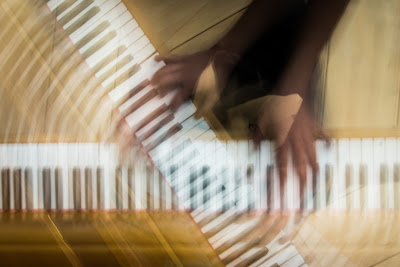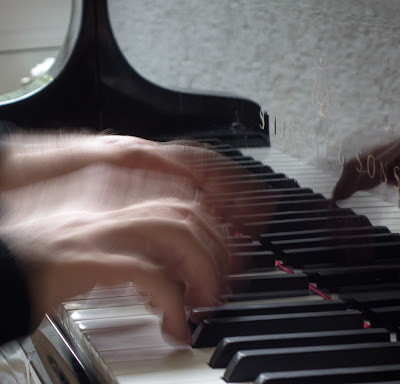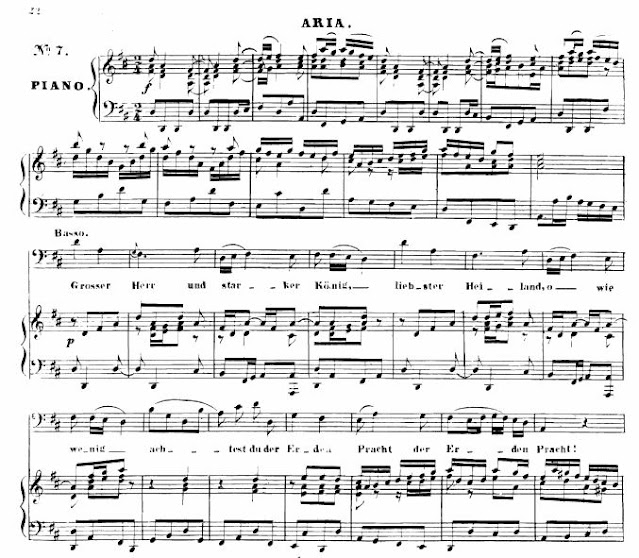Years with the piano
After two years of piano lessons with a nice old lady, I could read music and play pretty well, apparently, though I never practiced and eventually gave up at 10 because I enjoyed baseball, football and basketball better.
Then in 1978 for Christmas I was given three books of Genesis sheet music and couldn't wait to get home every day and play the songs I loved so well. "Squonk" became my favorite piece and even my nickname among some friends. While I was at it, though, I would look through the piano bench for other music. I discovered Beethoven's "Moonlight" Sonata and played the first movement of that before I went off to college.
At William and Mary I began lessons for a year with a man who started me over, so to speak, with the Bach Inventions and bits of Haydn sonatas (because I had books of those pieces already). He set me onto the Invention #8 in E Major "because it was jazzy". I guess I had played him some of my Genesis and he thought there were similarities.
Although theater had become my main focus at college, I also realized that music was something I also wanted to explore more closely. I went to Friday afternoon recitals given by other students and remember clearly hearing Kathy Geralds play the first movement of Beethoven's Op. 109. When David Eye asked me which piece in the recital I liked best, I answered, "Beethoven's 109th sonata." He set me straight about opus numbers. To this day it is one of my favorite pieces and that performance, plus her complete rendition during her senior recital, served as the germ of my enthusiasm for the Beethoven sonatas.
David and other music lovers were in the music fraternity Phi Mu Alpha (or sorority Delta Omicron). I joined it and had to play a piece in a recital as part of the initiation. It was Debussy's "Le petit negre", also a jazzy piece which I practiced with my teacher. Whereas I had no stage-fright on the theater stage - only heightened states of awareness - before a piano performance I got the runs and just felt awful. I got through the Debussy, but it was not a pleasant experience.
At the end of the year I had to play a piece in front of a jury of piano professors and I remember getting so nervous performing on the new Steinway Grand in the big recital hall that I lost my place somewhere on the second page of the Bach Invention and just gave up.
Thus were my experiences until I met Christine Williams. She was the young wife of Edgar Williams, who became my music theory teacher. Christine had a very personable way about her that relaxed me and made me want to do my best for her. She found the perfect pieces for me. First it was Mozart's d minor Fantasy, which I practiced and performed for friends on so many different instruments and occasions that I felt totally on top of it whenever I sat down to play. She played Debussy's "Reflets dans l'eau" for me one day and I started to learn it. I practiced Beethoven's "Pathethique" Sonata and several Chopin Preludes and Mazurkas and even the Etude in f minor. My favorite piece during that time was Debussy's "Reverie", which I played for everyone and think today that it was a good choice for me at that time. When Leonard Pennario gave a recital at William and Mary that year, he played it as an encore! For the jury at the end of the year I played the Mozart and got an "A".
I also remember working up Chopin's c minor Etude and playing it for Christine pretty much in tempo. Her response was priceless: "Well, you don't have to play it any faster, but a few right notes would be nice!" Recently I worked it up again with Russudan Meipieriani and got it down fairly well.
The following summer I worked in Norfolk doing door-to-door sales in the afternoons. In the mornings I remember sight-reading through the expansive library of old sheet music books my father had bought somewhere, plus the Beethoven Sonatas and short works of Debussy that I had purchased. Again, I played and didn't work too much on my technique. I also improvised a lot and even made some recordings of some of the "pieces" which developed.
In the autumn I went off to study in Münster, Germany, and listened to lots of music every day and went to concerts several times a week. I had two pianos to practice on and did so, though my practicing was more just playing through my pieces for enjoyment. Oh, if I had only known then what advantages good practice habits could bring to bear! And yet from the music courses I attended at the university and music school - as well as all the concerts I went to and talked about enthusiastically with friends - I brought back a deeper understanding of music and the fascinating connections between composers' lives and times and their compositions.
One of the best music experiences I had there was when Elizabeth Baigent and I discovered a beautiful old Steinway "B" grand in a nursing home nearby. We would go there Saturdays and I would accompany her singing Bach and Purcell. Her four boys have become highly acclaimed musicians in England.
When I returned for my senior year at the university in Virginia, I spent four afternoons a week at the radio station WCWM spinning classical records for Williamsburg's listeners. During the course of the year, I interviewed all the music professors live on air: Jack Darling, Frank Lendrim, Joel Suben and Edgar Williams. Two interviews really stick out: When I asked Professor Lendrim what he would recommend I play for our listeners who wanted to hear "beautiful music", he replied, "A Beethoven slow movement." Every time I listen to one, I think of him.
My first interview at the beginning of the year was with Professor Williams. The record collection at the radio station was arranged into "Baroque", "Classical", "Romantic" and "20th Century" music. So that's how I classified music in my mind. I played two of Williams' own compositions for the listeners and then talked about them with him. The first was a piece he had written for marching band called "Fanfare", I believe, that blew out all the stops - very Mahleresque in the best sense! The second piece was called "amoretti" for cello and piano, which tested - for my amateur ears - the patience of inexperienced listeners. I asked him quite naively, "If you can compose a beautiful piece like the one for marching band, why did you write the second one?" I don't remember his exact answer, but I do know that he was very patient with me that day, despite being quite tired. My second question about "amoretti" wasn't much more informed, but it gave him a good chance to show off his sense of humor. When I asked how he would classify the composition style of "amoretti", I suggested "20th century?" (which for me was everything from Schönberg to Reich) and he paused briefly and said, "Well, I hope so!" The penny dropped, we both laughed and we went on to the next piece.
I didn't have time to practice the piano my senior year, so I stopped taking lessons. However, I had already paid for the first semester, so Christine and I tried working on my sight-reading skills and I played some of my composed pieces which were the result of endless sessions of improvisation the previous summer. She referred me to her composer husband, but I think I just wanted to let the pieces stay as they were. Perhaps I was afraid he'd turn my arpeggios into amorettos.
One of my girlfriends that year came from a musical family and played the piano extremely well. She introduced me to Shostakovich's 24 Preludes and Fugues, Op. 87, which accompanied me through the next decades at the keyboard.
After graduating from college, I went back to Europe to look for a job and soak up some culture. While visiting my sister in Vienna, I had the opportunity to play on the grand piano that was in a friend's apartment. Only having an hour or so at irregular intervals - and having no money to pay for lessons - I usually just played the intermediate pieces in a book I found there, including Saint-Saens' "The Swan", and played the Genesis, Mozart and Beethoven that I still remembered.
While visiting Berlin for a week with a group of 50 other foreign students, I played for a good hour in a café where we were all eating, entertaining the others who, lucky for me, didn't pay all that much attention to my playing. While in Berlin, I heard a recital by Shura Cherkassky, heard Pollini play Beethoven's Fifth Piano Concerto and Choral Fantasy (in one evening) and thrilled to Haitink's rendition of Shostakovich's Eighth Symphony (paired with Brahms' Violin Concerto featuring Schlomo Mintz). What a week!
In Münster my friend Waldemar taught me a couple of pieces on the guitar that I had heard him play and wanted to learn: Villa-Lobos' Prelude #4 in e minor, the Carcassi Etude Op. 60, #3, and "Horizons" by Steve Hackett (of Genesis). Since I didn't have a piano to play in Münster, but guitars were readily available, I picked up that instrument for my musical enjoyment.
The next two years I didn't have much of an opportunity to play the piano and when I moved into a small apartment in Richmond, I bought a Yamaha CP-70 electric piano, which really didn't satisfy my needs. The "Pathetique" sounded as strange on it as did "Squonk". My friends and I used it for jam sessions when we improvised in my apartment, though. An incredibly talented Italian named Carlo Pasquini would come over and improvise four-part choral pieces with us.
I wanted to play Mahler's "Ich bin der Welt abhanden gekommen" with the music teacher at the school where I was teaching. We were going to have a Hootenanny, an evening of music performances and singing at the school, so Tony and I practiced it, with me accompanying his tenor horn. I worked a lot on it, but since I still didn't know how to practice correctly, there were a few places where I just couldn't keep up with him. A few days before the performance date, he - perhaps to save us both some embarrassment - said he needed to play a different instrument in a professional concert soon and needed to "prepare his chops" for that instrument and wouldn't be able to play with me. So I played the Mozart Fantasy and that was that.
Back to Germany. In 1990 I moved into a fraternity house for the first year of my studies. I was at the university to study musicology and had discovered an accomplished pianist and a fellow musicologist living in the house - and a tuned piano in the basement - so I gave it a go. I exchanged piano lessons for English instructions with a Japanese friend during my years there. One day we discovered how relatively difficult (or simple, depending on what you grew up with) English pronunciation and Chopin etudes can be. It's all about training your muscles to react correctly, I learned.
My best memory from that basement was when a friend from Munich visited me and wanted to hear me play. Strangely, not many friends ask me to play for them, but when they do, I usually love it. I presented her with my entire repertoire and was in pretty good shape that day. I couldn't imagine playing for others regularly as concert pianists do, but this was a very rewarding experience.
Through my Japanese friend I got to know her roommate Zsuzsa Németh, who was playing the Liszt b minor Sonata and Scriabin's Fifth Sonata at the time. I love both pieces and had been particularly fascinated by the Scriabin ever since I hearing Haisun Paik play it at the William Kappel Piano Competition in 1989. (Yes, I drove to New York City and Knoxville, KY, to hear her play it again!) Being one of the most difficult pieces in the piano repertoire, I figured it would be well out of my reach, but Zsuzsa showed me how to play the 4 against 6 measures where the piece gets rocking and I gave it a go. I played it several hours a day (much to the duress of my neighbors below) for four months straight. What a fantastic piece! Every now and then since 1994 I'll work it up again, always going a bit further with each attempt.
Meanwhile, I had found a teacher in Freiburg, Matthias Hanel, who gave me help with my technique and interpretation skills. I moved into my own apartment and bought a Blüthner grand piano and was starting to get serious about wanting to play the piano well. My best friend, Christian Ruvolo, was a concert pianist and often played at my place. I attracted other musicians and we supported each other however possible. Having moved on - or back - to being a language expert, I would edit their resumés or CD booklets and they would invite me to their concerts.
The piano was an important part of my life. When my son was four days old, I dreamed that he was sitting on my lap at the piano and he played a five-note scale with his little fingers.
When I moved to Stuttgart in 2002, the Blüthner moved with us and our first two children had lessons from an early age. They had good teachers and learned to play well. When their second teacher moved out of town, Nestan Bagration-Davitaschvili, my wife's choir director, offered to continue teaching them in exchange for English lessons. She was gracious enough to give me lessons, too.
That year we worked on many different pieces, including Shostakovich, Scriabin, Brahms, Mozart - and Genesis. I was going to receive a visit from the amazing pianist and Genesis arranger, David Myers from Canada and I wanted to play one of his arrangements for him, so Nestan and I worked on "Firth of Fifth". It was a particular thrill when Nestan once said after 30 minutes of Op. 87, "OK, Jim, enough of Shostakovitch. Now Genesis!" God, I had been waiting 40 years for a piano teacher to say that to me! David came and I played his piece for him and a couple of friends, including Nestan. I got through it without too many mistakes. It remains one of the most memorable moments of my life.
After Nestan moved to Berlin, her friend Russudan took over the helm of the choir and, eventually, also traded piano lessons for English support. Again, we went through a lot of repertoire, including Bach, Schubert, Mahler, Genesis and Chopin. The Nocturne, Op. 27, #2, was a piece I heard Mary Przypyszny play at William and Mary. It had always charmed yet intimidated me, but eventually I reasoned that if I could work up some of those other pieces, I should be able to manage that. I played it for her several times and finally it got to the point where she said, very wisely, "I don't have anything else to say about your performance. It is very good." I took that as a blessing and, after inviting her family and a dozen other friends over to my house for my 55th birthday, I thought I'd play it for them. I got so nervous that I had to break it off after a few bars. It just wasn't going to happen. I hadn't played it for enough people beforehand and the pressure was so great that my fingers began shaking uncontrollably.
Something I like playing these days just for fun are transcriptions of symphonies which I love, be they from Sibelius, Bruckner, Beethoven or Mahler. You learn so much more about the inner workings of the music when you play all the voices yourself. Never having had the opportunity to play in an orchestra myself (though I've been going to orchestra rehearsals just to listen and learn ever since college), I like playing orchestral music on the piano.
So that's where I am now. I've had several piano students over the past few years, who have all taught me as much as I've taught them. Whenever you pass on your knowledge to another person, you have to bundle what you've learned and communicate it in a way that you and your students can understand and remember. It seems I've finally understood a lot of what my past teachers have hoped to impart on me by teaching my students, and I hope I can remember to tell them all the important things I've learned. There is no doubt, however, that I'll pass on my enthusiasm for the king of instruments!









Comments
Post a Comment